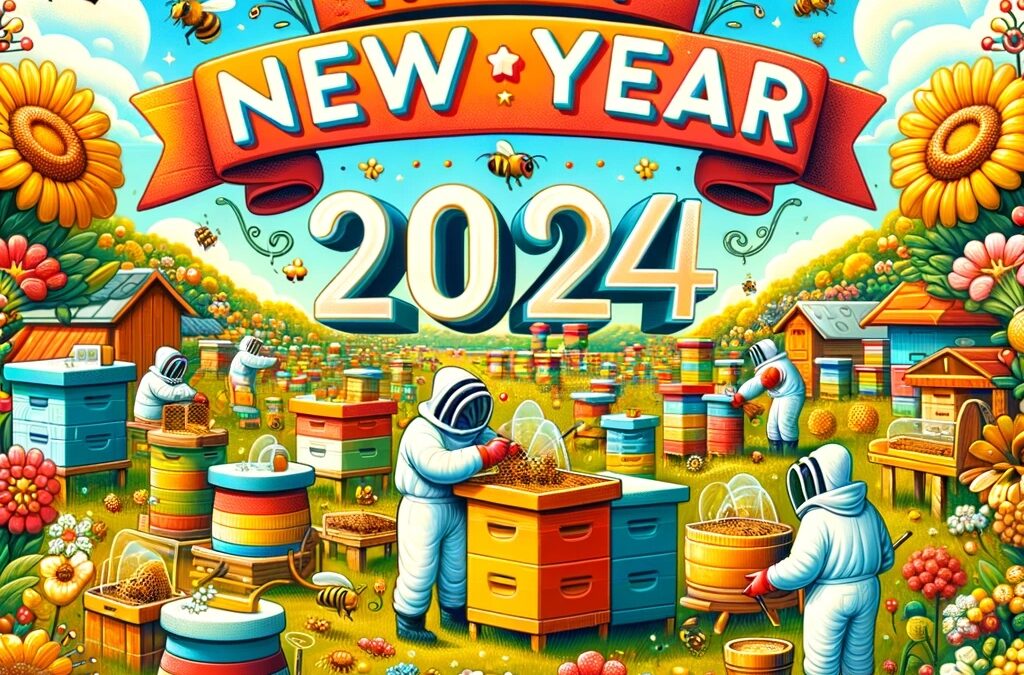Happy New Year 2024! As we welcome this new year, it’s an opportune time to explore the fascinating world of beekeeping and its significance. Beekeeping, an age-old practice, has gained considerable attention in recent years due to the critical role bees play in our ecosystem. As we step into 2024, let’s delve into this incredible world and understand why beekeeping is more than just a hobby or profession; it’s a vital component of ecological balance and sustainability.
The Importance of Bees in our Ecosystem
Bees are essential pollinators. They play a critical role in the reproduction of many plants and crops. Without bees, our diets would lack diversity and nutrition, as many fruits, vegetables, and nuts are dependent on bee pollination. The decline in bee populations in recent years has been a significant concern, highlighting the need for bee conservation efforts.
Beekeeping: A Sustainable Practice
Beekeeping contributes to the conservation of bees. By maintaining healthy bee colonies, beekeepers ensure the continuation of these vital pollinators. Moreover, beekeeping can be a sustainable practice. Beekeepers can harvest honey, beeswax, propolis, and other bee products without harming the bees, making it an environmentally friendly practice.
Honey: A Natural Wonder
Honey, the primary product of beekeeping, is a natural sweetener with numerous health benefits. It’s rich in antioxidants and has antibacterial properties. Local honey can also help alleviate allergies by exposing individuals to small amounts of local pollen.
The Challenges of Beekeeping
While beekeeping can be rewarding, it also presents challenges. Pests, diseases, and environmental factors can impact bee colonies. Varroa mites, for instance, are a significant threat to bees. Climate change also affects bee populations, as it alters flowering times and weather patterns.
Technological Advancements in Beekeeping
The integration of technology in beekeeping, such as remote hive monitoring and automated harvesting systems, has made beekeeping more efficient and less intrusive for the bees. These technologies also help in the early detection of issues within the hive, allowing for timely intervention.
Urban Beekeeping: Bringing Bees to the City
Urban beekeeping has gained popularity, bringing the practice to city landscapes. Rooftop and balcony beekeeping initiatives help increase bee populations in urban areas and aid in urban pollination.
Educational and Community Involvement
Educational programs on beekeeping and its importance have become more prevalent. These programs not only teach the technical aspects of beekeeping but also raise awareness about the ecological significance of bees. Community involvement in beekeeping projects fosters a collective effort towards sustainability and environmental consciousness.
Looking Ahead: The Future of Beekeeping
As we move forward in 2024, the future of beekeeping looks promising. With growing awareness and technological advancements, beekeeping practices are evolving. The focus is increasingly on sustainable and bee-friendly methods.
In conclusion, beekeeping is a practice that offers extensive benefits, not only to beekeepers but to the environment as a whole. As we celebrate the New Year, let’s acknowledge and support the role of beekeeping in preserving our natural world. Happy New Year, and here’s to a year of healthy bees and flourishing ecosystems!

